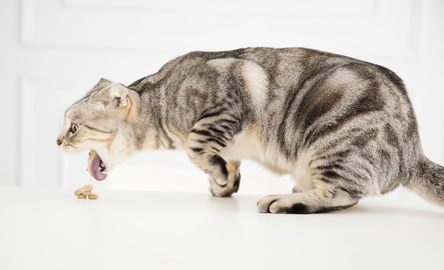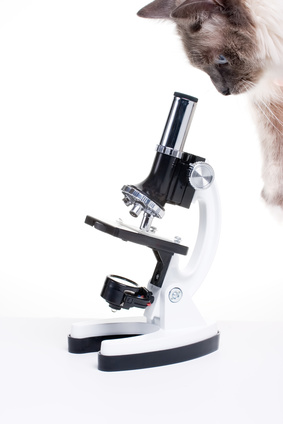
My cat vomits time to time, it's normal, non ?

Vomiting are symptoms frequently encountered in cats.
They can be observed as acute (sudden appearance and limited time) or chronic form (regular vomiting, more or less frequency and lasting in time).
The causes of vomiting are many ! Some are benign, but others can be serious and should not be neglected.
Many cats who vomit 2 to 3 once a month and who have no other symptoms.
Maybe you ask yourself "Is it normal that my cat vomit ? ”, "When should I be concerned ?”, "Should I consult a veterinarian ?”.
Here are some answers ...
How to define vomiting ?
Vomiting correspond to the expulsion of stomach contents through the mouth under the action of the contraction of the abdominal muscles and diaphragm. They followed a period of nausea resulting in yawning, salivation, a licking, prostration.
It should not be confused with vomiting regurgitation corresponding to expulsion of the contents of the esophagus shortly after ingestion of food. Unlike vomiting, the regurgitation is not accompanied by abdominal contractions.
Vomiting can be food (rejection of the meal) or Fluid (presence of gastric juice). They are sometimes accompanied by other symptoms : weight loss, diarrhea, abatement, Anorexia, fever, increased fluid intake, balance disorders, jaundice (yellow coloring mucosal) ... But they can also be isolated.
What causes vomiting ?
Vomiting is present in numerous diseases, not just in digestive diseases.
On distingue 2 types of cases :
- Causes "digestive" related ailments affecting one or more parts(s) gut (stomach, small intestine, colon) :
gastric ulcers, intestinal obstruction if swallowed foreign bodies or hairballs, parasitism, chronic gastritis, inflammatory bowel disease, intestinal bacterial overgrowth, gastric or intestinal tumor, viral gastroenteritis (acute form)… - Causes "extra-digestive" linked to diseases that affect the digestive tract not :
infection of the uterus (pyometra), central nervous system (meningitis, tumor, intracranial hypertension), endocrine diseases (hyperthyroidism, Diabetes, hypercalcémie), renal failure, Hepatic insufficiency, cancer, peritonitis, pancreatitis, ingestion of drugs or toxic ...
Given the multiplicity of causes, prognosis and treatment of emesis are obviously vary according to their origin.
when to see ?
When your cat sub acute vomiting, it is necessary to quickly consult your veterinarian. A cat that vomits several times in the same day, this is not normal. It can quickly dehydrate and weaken.
For chronic forms, Everything depends, of course, frequency of vomiting but know that a cat vomits regularly for over 3 weeks should consult, even if only once a week.

Certainly, sometimes cats vomit without that it is serious but it is essential to consult your vet to ensure that no underlying disease is present.

What solutions ?
Depending on the clinical examination of your pet, your veterinarian may decide to perform a number of additional tests (Blood tests, Imaging tests, endoscopy, analyzes stool, analyses d’urine…).
Once the diagnosis is established, treatment may be prescribed. Highly variable drugs will be used depending on the cause vomiting. Sometimes, a change in the animal feed type is also necessary.
Finally, if the animal is dehydrated and impaired general condition, he will be hospitalized.
§
Acute vomiting should always make you quickly consult your veterinarian to quickly treat your pet and avoid complications. But it does not take much to minimize and trivialize chronic vomiting. A cat that vomits is not necessarily depressed and anorexic yet these vomiting may be the first call sign of an underlying disease sometimes severe.
If your cat vomits regularly, do not hesitate to consult a vet to ensure that no associated pathology is present and, if it was the case, can develop a treatment as soon as possible.
Author : Dr. Magali Pernot. Illustrator : Dr. Caroline Allard – Vetup®
